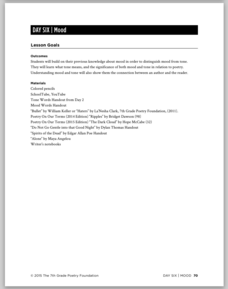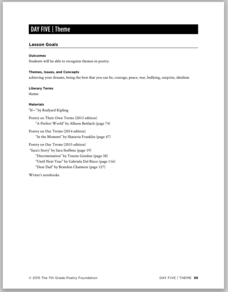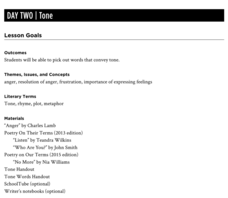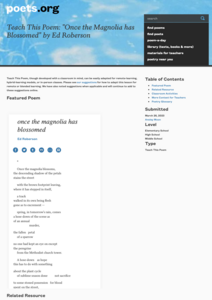University of North Carolina
Roles & Powers of the President
Here is a fantastic, comprehensive resource on the roles and powers assigned to the president of the United States. It includes several critical thinking exercises and engaging activities, from cartoon analysis and the opportunity to...
University of North Carolina
American Revolution: Events Leading to War
After learning about the growing revolutionary sentiment among colonists, class members work in small groups or pairs to design a political cartoon.
University of North Carolina
Remembering Martin Luther King, Jr.
After reading the article "Kings Dream Everyday," class members conduct a Socratic seminar discussion of Martin Luther King's contributions to the civil rights movement. They then read and respond to a passage from Michael Eric Dyson's...
University of North Carolina
The War of 1812
After reading a sample memo regarding the conflict between Britain and France before the War of 1812, class members assume the role of James Madison and brainstorm how to handle the situation. They will then analyze the creation and...
University of Minnesota
Inquiry Cubes
How do you teach kids to "science" effectively? Inquiry cubes are a "sort of" puzzle with no answer—promoting even more questions! Group members work together to use the evidence on the visible sides of each cube to infer what lies on...
University of Minnesota
Motor Learning and Memory
What do our brains have to do with reaction timing? Everything! In a hands-on learning activity, young scientists participate in four card activities that measure reaction timing. Each activity gets progressively more complex, and...
University of Minnesota
Close-up of the Nervous System
Make sure your class gets on your nerves! Learners of all ages practice peering into the nervous system to see what's inside. Groups examine prepared slides of mammalian nervous system tissues, all while gaining microscope skills. The...
Curated OER
Reflection
The tenth lesson in the 12-part poetry unit asks seventh graders to reflect on their learning about poetry and share their work with other poets.
Curated OER
Poems and Resources for the Struggling Writer
The 11th resource in a 12-part poetry unit is a bonus lesson comprised of poems, activities, and resources that review the essential concepts of the unit.
Curated OER
Ballad
Young balladeers analyze examples of ballads and generate a list of common traits (story, quatrains, rhyme schemes, refrains, etc.), then identify these traits in Robert W. Service's "The Cremation of Sam McGee" and a ballad written by...
Curated OER
Concrete Poems
Concrete poems, or shape poems as they are sometimes called, are the focus of the eighth instructional activity in this poetry unit. Young scholars examine several examples of concrete poems and consider how the shape contributes to the...
Curated OER
Personification
Spongebob Squarepants helps teach middle schoolers about personification! After discussing the human characteristics demonstrated by the cartoon character, scholars identify the personification in poems by Emily Dickinson and Langston...
Curated OER
Poetic Devices
Introduce middle schoolers to poetic devices with a lesson plan that asks them to find examples of alliteration, anaphora, onomatopoeia, metaphors, similes, and personification in various poems. Young scholars craft examples of these...
Curated OER
Mood
Young scholars learn how to distinguish between the mood of a piece of writing (how the work makes the reader feel) and the tone (the writer's attitude toward the material) in the sixth lesson in a poetry unit. After watching two very...
Curated OER
Theme
A study of Rudyard Kipling's poem, "If," launches a lesson plan about theme. Class members read Kipling's poem and poems by other seventh graders to identify the themes.
Curated OER
Revision
Young poets learn the value of using a thesaurus when crafting and revising poems. They examine poems rich in figurative language and then a revised version with the figurative language removed. To demonstrate what they have learned,...
Curated OER
Tone
Identifying the tone in a piece of writing can be tricky. Readers don't have the advantage of studying the images and colors used in a painting or the instruments and sounds of a song. The second lesson in this poetry unit teaches tweens...
Curated OER
What Is Poetry?
The first lesson of 12 in a poetry unit asks class members to develop their own definition of poetry. After crafting a response, they examine a variety of examples and decide if the resources are or are not poems.
Academy of American Poets
Teach This Poem: "Instructions on Not Giving Up" by Ada Limón
What do the myth of the phoenix bird and Ada Limón's poem "Instructions on Not Giving Up" have in common? Young scholars create a list of what they notice about both the myth and poem, then consider what the similarities might indicate...
Academy of American Poets
Teach This Poem: "somewhere i have never travelled,gladly beyond" by E. E. Cummings
Scholars engage in a role-play exercise, compare their demonstration to a time-lapse video, and to a poem by E.E. Cummings. The ensuing discussion asks learners to consider the similarities among the three.
Academy of American Poets
Teach This Poem: "Once the Magnolia has Blossomed" by Ed Roberson
A free write, an image of magnolia leaves, and the Ed Roberson's poem "Once the Magnolia has Blossomed" ask scholars to use their noticing skills to reflect on the lesson plan beauty teaches about loss and grief.
Utah Education Network (UEN)
Know Your Literature Genres
Open the library for young readers by introducing them to the main genres and sub-genres. A podcast and two presentations identify the characteristics of the different genres. Groups then sort through a box of books and, using evidence...
National Endowment for the Humanities
Shakespeare's Julius Caesar: Leadership and a Global Stage
Shakespeare's Julius Caesar is, among other things, the study of a ruler's ambitions. Young scholars watch videos, read articles, and keep a Commonplace Book while studying the play. At the end of Act III, pupils stage the play that...
Utah Education Network (UEN)
7th Grade Poetry: Sonnet Poem
Two sonnets provide seventh graders with examples of Shakespearean sonnets. After discussing the story of the poems and analyzing their rhyme scheme and rhythm, young poets craft a Shakespearian sonnet and share their work with two...

























